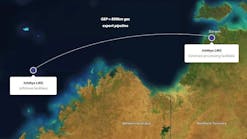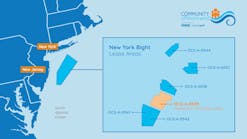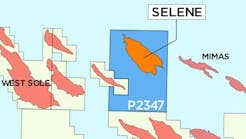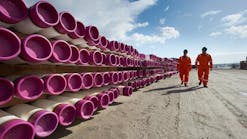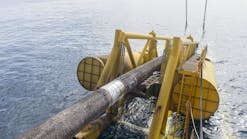BG's holdings offshore Egypt.
Almost single-handedly, BG (formerly British Gas) is helping to open up the Mediterranean sector of the Middle East as a new deepwater province. In the past year, BG has notched a string of successes in deepwater off Egypt and Israel.
- Since 1997, the company has drilled 11 exploration and appraisal wells in the Nile Delta off Egypt, with a 100% success rate.
- One of the company's successful wells tested the highest gas flow rate in Egypt, at 90 MMcf/d of gas.
- Off Israel, the company has participated in two deepwater discoveries.
The goal of BG from the onset has been the development of the gas chain. This involves linkage of the company's upstream and downstream businesses in developing the supply of energy markets.
In the past, the main thrust of this plan was focused on the UK, but with the growing maturity of the region's gas industry, the company began looking internationally.
"The gas industries in Europe and the United States are mature and have developed incrementally over time. In new gas markets, such incremental growth would take place on a time scale that is unacceptable," said Stephen Brandon, BG's Executive Director.
With larger faster-growing populations, they need more energy sooner. Yet, the fact remains that developing offshore gas reserves, an appropriate transportation infrastructure, and an onshore distribution network is a capital-intensive operation. The key, therefore, lies in identifying a near-term critical mass of demand that will justify offshore development and onshore infrastructure," he added. Hence, the company headed to areas such as Egypt to develop the energy needs of the growing population.
Egypt operations
BG's holdings offshore Israel.
BG has been drilling successful wells offshore Egypt since 1997 and has been operating in the country since 1989. BG and its partners signed a 25-year franchise agreement for the exclusive right to develop the gas market in Upper Egypt. In addition, the company is involved in the development of a gas transmission and distribution network that will deliver gas to industrial, commercial, and domestic customers in Upper Egypt.
Since 1989, the company has invested over £300 million into Egypt and plans to invest over £750 million over the next three years on approved projects, which will deliver gas to the national grid.
The scope of the forthcoming investments will go towards two major offshore projects - development of the Rosetta Field and the Scarab/Saffron Field.
- Rosetta: The Rosetta concession covers 3,730 sq km of the Nile Delta area in the Mediterranean Sea. The first discovery well on the concession was drilled in 1997 in 61 meters of water and tested over 60 MMcf/d of gas. The company then drilled an appraisal well in November of 1997 and after seven months of testing, the company and its partners quickly signed a gas sales agreement with Egyptian General Petroleum (EGPC) to supply gas to the national grid system east of Alexandria. First gas is expected for delivery this year at a rate of 275 MMcf/d.
Subsequently, two additional discoveries were made on the concession, each containing over 235 meters of net gas pay. A joint venture company, Rashid Petroleum, was then formed to develop the discoveries and handle all future exploration operations in the block. In 1998, a second 3D seismic program was performed on the concession and identified additional prospectivity. Partners in the concession include BG (operator) - 40%, Shell - 40%, and Edison International - 20%. Partners in Rashid Petroleum include BG - 20%, EGPC - 50%, Shell - 20%, and Edison International - 10%.
- Scarab/Saffron: The Scarab and Saffron fields are located in the West Delta Deep Marine concession in the Nile Delta.
The first well drilled in the concession was the Scarab-1, which tested 30 MMcf/d of gas. This was followed by the Saffron-1, which tested over 90 MMcf/d and is one of the highest flow rates ever recorded in the country. Two appraisal wells then followed and confirmed the Scarab/Saffron Field held reserves in excess of 4 tcf of high-quality gas. These wells, drilled in 1998, were in water depths of over 600 meters representing some of the deepest drilling ever in the Nile Delta.
In August of last year, BG and its 50% partner, Edison International, signed a gas sales agreement to develop the Scarab/Saffron Field. This will be the largest gas field development in Egypt and the first use of deepwater technology.
BG and Edison have established a joint venture company with EGPC called Burullus Gas for the development. Late last year, the company awarded a $50 million contract to a consortium of Bechtel and Intec Engineering to provide deepwater contractor services to the development. Bechtel will be responsible for the onshore gas plant engineering and overall procurement and project management, while Intec will be responsible for the offshore segment. of the project.
The total development cost has been estimated to be $600 million and will involve a long-distance subsea tieback of eight subsea wells to onshore facilities located adjacent to those for Rosetta designed to deliver 600 MMcf/d of gas and 3,000 b/d of condensate. An additional 20 wells are planned for further expansion of production. Production is scheduled to begin in January of 2003 and will flow 530 MMcf/d of gas for a period of at least 17 years.
In addition to Scarab/Saffron, two additional discoveries have been made in the concession. BG drilled the Simian-1 and P12/P13 wells, which each tested 44 MMcf/d of gas. The companies are considering development alternatives.
Israel operations
Beyond Egypt, BG has looked to position itself in other countries in the region. One such country, Israel, has begun to yield the company a great deal of success. The prospectivity of Israel's deepwater was first established by Samedan with the Noa-1 well in 2,555 ft water depths in exploration license PL 273. The Noa-1 well tested at 30 MMcf/d of gas.
Following Noa, a second deepwater well was drilled by Isramco in the 2,000 sq km Mediterranean Sea license Med Yavne, the Yam-West. The company then followed with the Or-1 well. At this time BG acquired a 50% interest in the Med Yavne license. The Or-1 well was confirmed as a discovery in a water depth of 695 meters and tested 21 MMcf/d of gas. A second well was then drilled, Or-South, which also was notched as a gas discovery.
Along with BG's 50% interest, the partners in the concession include Isramco - 42%, and Delek Drilling - 8%. BG has now assumed operatorship of the block, and along with the partners, have begun a $1 million 500 sq km seismic acquisition over the concession.
BG has since has submitted a joint development and unitization of the Or-1 and Or-South wells with the Noa-1 well operated by Samedan to the Israe* government.
The company has also acquired 50% interests in the Med Tel Aviv, Med Hadera, Med Ashdod, and Med Hasharon concessions - all operated by Isramco with 46% interest. Delek Drilling holds the remaining 4%.
Palestine operations
Elsewhere in the Middle East, BG is stepping up its involvement in exploration. In November, the company was awarded the first-ever exploration license from the government of Palestine. The agreement calls for BG to drill a minimum of two exploration wells in the first 18 months.
The term of the agreement is for 25 years. BG, with partner Consolidated Contractors, plans to establish the country's gas industry by conducting exploration, field development, and building a gas pipeline infrastructure. The company is now shooting 1,000 sq km of seismic data offshore Gaza.
BG's focus on quick development of these gas discoveries has placed them in a pivotal lead position in the region. With their successes mounting, other operators are beginning to take interest in the region and the Middle East deepwater is on its way to the forefront of activity.
